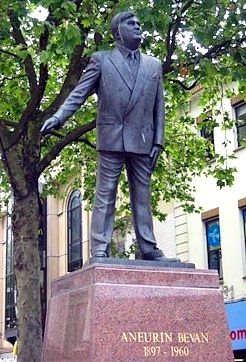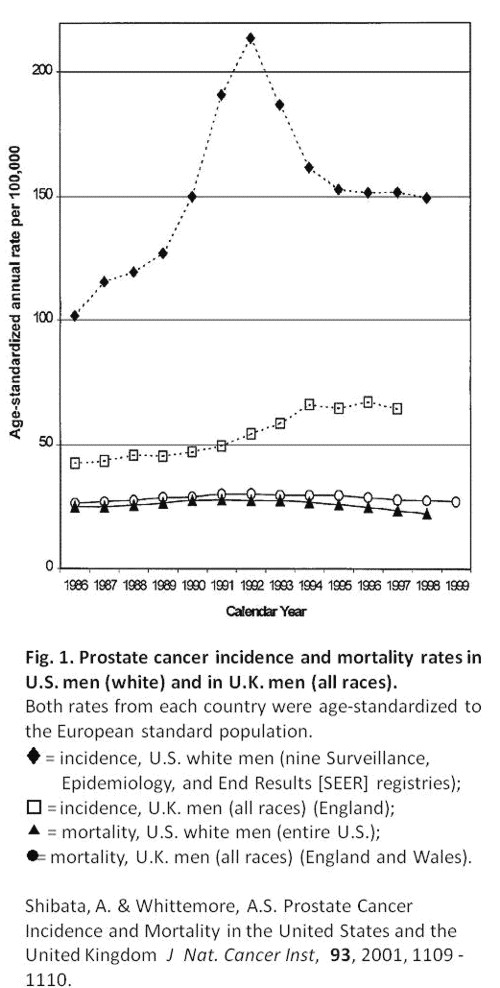
Conservatives in the USA have been lying about the NHS on a massive scale. As Simon Hoggart comments today “There are few tribes more loathsome than the American right”.
In the forefront has been a far-right lobby group, Conservatives for Patients’ Rights (CPR). Even I was surprised to read in the Washington Post
“The campaign is being coordinated by CRC Public Relations, the group that masterminded the “Swift boat” attacks against 2004 Democratic presidential candidate, John F. Kerry”
CRC Public Relations is a conservative PR firm previously known as Creative Response Concepts. ‘Creative’ appears to mean ‘lying’, but I guess that is what PR is all about.
The founder of CPR, Rick Scott, has an interesting background. According to Stephen Barrett
“In 1987, he founded and became chief operating officer of a hospital chain that grew into the 23 billion-dollars-a-year Columbia/HCA. In 1997, a few weeks after the FBI raided HCA hospitals in five states, Scott was ousted as CEO and three executives were indicted on charges of Medicare fraud. The FBI’s investigation found that the hospital chain had been overbilling Medicare and giving kickbacks to doctors who steered patients to its hospitals. The overbilling included upcoding lesser procedures to get higher reimbursements and billing for lab tests that were not medically necessary and were not ordered by physicians. The situation was settled with a set of guilty pleas and criminal and civil fines totalling $1.7 billion. The U.S. Department of Justice referred to the matter as the “largest health care fraud case in U.S. history.”
Disgracefully, Karol Sikora, a former oncologist at the Hammersmith Hospital, supported CPR on US television. See Karol Sikora makes a fool of himself at NHSblogdoctor. I quote
“Karol Sikora had been duped by a slick American businessman into providing a “rent-a-quote” service for a notorious right-wing American organisation”
This post was reproduced on the US site, Trusted.MD
Sikora now works for the UK’s only private university and a private cancer treatment company. He is also famous for claiming,
falsely, to be a professor at Imperial College (he has an honorary contract with the Imperial College Hospital Trust but nothing with the University). And for promoting a load of nonsense about
alternative medicine (a lot more on that coming up shortly).
This is why love the NHS
Europe as a whole gets better health care for less money than in the USA. The fact that every US doctor has a financial interest in ordering expensive treatments whether they are needed or not,
is an obscenity. The fact that over 40 million Americans have no insurance is an obscenity (see The brutal truth about America’s healthcare).
Just look at the numbers (Source: WHO/OECD Health Data 2009)
Health spending as a share of GDP.
US 16% UK 8.4%
Public spending on healthcare (% of total spending on healthcare)
US 45% UK 82%
Health spending per head
US $7,290 UK $2,992
Practising physicians (per 1,000 people)
US 2.4 UK 2.5
Nurses (per 1,000 people)
US 10.6 UK 10.0
Acute care hospital beds (per 1,000 people)
US 2.7 UK 2.6
Life expectancy:
US 78 UK 80
Infant mortality (per 1,000 live births)
US 6.7 UK 4.8
My experience
Yes I know this is anecdote, but it matters a lot to me. I already posted a version of this story, but this seems like the time to repeat it.
On December 13th 1984, my wife had a subarachnoid haemorrhage when she was seven months pregnant. After an initial misdiagnosis by an obstetrician at St Peter’s Hospital, Chertsey, she was moved to UCH and diagnosed very quickly. The next morning I was called to see the neurourgeon, the great Alan Crockard. He was sitting surrounded by medical students some of whom I’d taught the previous year. He told me my wife had had a subarachnoid haemorrhage (at 33!) and they would operate straight away. And “I have to ask you, if we can save only the mother or the baby, which shall it be”. It’s as well to write that down because even 24 years later I can’t say it without a lump rising in my throat.
That same day she had neurosurgery to pin an aneurysm at the Maida Vale Neurosurgical Hospital, part of the UCLH group (it no longer exists). The surgeon, Alan Crockard, came out of theatre after five hours, looking rather tired and said “it was adhered to the optic chiasma on one side and about a millimetre from the pituitary on the other. It was a bit tricky but I think we got it”. Obstetricians were in theatre too because all this was done with the baby still in situ
| After a week in intensive care, under heavy sedation, Margaret’s blood pressure was not low enough and they decided to deliver the baby. At about 4 pm on a snowy Christmas Eve, a team of neurosurgeons and a team of obstetricians gathered and soon after, Andrew Stuart Colquhoun emerged in a small incubator to be whisked off in an ambulance to the Special Care Baby Unit at UCH (run, at that time, by Osmund Reynolds). Christmas day was spent in the hospital, with Margaret’s mother. Andrew weighed 1.4 kg at birth, but by Christmas day he had pulled out his ventilator himself, and was doing fine. He was so tiny that it was a couple of days before I dared to hold him. The Unit had racks of doll-sized clothes, knitted by volunteers. The care was superb. | 
Andrew (at 9 days) and Dad. Jan 2, 1985. Click for album. |
Once Margaret was well enough, she was given a side room in a neurosurgical ward with a cot for Andrew by her bed, an arrangement that gave the neurosurgical nurses some fun. They were in UCLH continuously until 27th April before Margaret had recovered enough to go home, [Full photo album here]
Now they are both fine.and Andrew is 6′ 7″ (200.5 cm)..
It is episodes like this that make one very proud of the NHS. She and Andrew were in hospital continuously for more than four months. Not a penny changed hands. Heaven knows what it would have cost in the USA, or even of insurance would have covered such a gargantuan bill.

Margaret & Andrew, with carer, Anna, June 2, 1985 |

Andrew (left) playing cricket in Bangladesh, Feb 2005. |
My own experience is trivial compared with that of Margaret and Andrew, but it has been as near perfect as anyone could wish. I had a lumbar spinal fusion (L3 – L4) in 1995, after several attempts at less drastic solutions. I’ve had two artificial hips. They allowed me to walk across the Alps for my 65th birthday. Then a few trivial things like bilateral hernia and DVT (I had been scanned and was on anticoagulant therapy within 4 hours of walking into UCLH’s Accident and Emergency). And now it looks as though I’ll be getting a partial or total nephrectomy too.
And not a penny has changed hands.
The NHS is a beautiful thing. OK it has has the usual excessive number of managers and HR-bollocks, like most big companies. It isn’t perfect but it is a great deal closer to perfection
than the US system.
 Approaching Seescharte (2600 m) at 08.20, 21 August 2001. Memminger Hütte visible below. With fused vertebrae and right prosthetic hip, thanks to the NHS. (Click for bigger picture.) |
Bush may have gone, but a large fraction of Americans seem to be unrepentant Bush-ites. Almost all of my many friends in the USA think more or less like I do. Even Obama is to the right of most European conservatives, The other 48% are to the right of Attila the Hun. The extent of the polarisation that still exists is nothing short of terrifying.
|
Thanks to the great Aneurin Bevan who established the NHS in 1948 for ordinary people like me, in the face of fierce opposition from the medical establishment.
|
 Statue of Bevan in Cardiff |
Ah well, The Daily Mash. is always there when you need a (wry) laugh
Follow-up
Paul Krugman in the New York Times is magnificent as always. In The Swiss Menace he points out that Obama’s scheme is nothing like the NHS anyway, but more like that in Switzerland.
“The plans on the table would, roughly speaking, turn America into Switzerland — which may be occupied by lederhosen-wearing holey-cheese eaters, but wasn’t a socialist hellhole the last time I looked.”
“In Britain, the government itself runs the hospitals and employs the doctors. We’ve all heard scare stories about how that works in practice; these stories are false.”
“So we can do this. At this point, all that stands in the way of universal health care in America are the greed of the medical-industrial complex, the lies of the right-wing propaganda machine, and the gullibility of voters who believe those lies.”
Comparing US and UK cancer statistics . As Ben Goldacre says, “I think you’ll find it’s a bit more complicated than that”. There’s an interesting analysis at Cancer Research UK
The US uses the PSA blood test far more widely than we do in the UK – despite questions over how effective it is at spotting cancers that would actually kill, as opposed to those that cause no symptoms. As a result, the USA has one of the highest recorded rates of prostate cancer in the world.
So although it’s undoubtedly ‘better’ at spotting prostate cancers, it’s also fair to say that some of these Americans will never die from their disease. This ‘overdiagnosis‘ inflates the survival statistics, at the expense of ‘overtreating‘ men – which is expensive and can cause long-term side effects (which can need further treatment).
In fact the age-standardised death rates per 100,000 people are almost the same in the UK (all races) when compared with the USA (whites only). What is different is that far more cases of prostate cancer are diagnosed in the USA. If the rate of ‘real’ (potentially fatal) prostate cancer were similar in both countries then both countries have much the same success in treating it, If, on the other hand, US men had a genuinely higher incidence of real prostate cancer, the US would be doing better, There is no way to distinguish between these two interpretations,



I’m glad all has turned out do well for you. For serious conditions I believe we have some of the best care in the world. Out in the district general hospitals I think things can be a bit more variable.
I didn’t realise Sikora had been making trouble over the pond too. Maybe it’s just the ones I’ve met and the friends who’ve become oncology registrars but I’ve always found oncologists to be an odd bunch, with a funny approach to EBM and a sense that cancer is somehow special, when compared to other serious diseases such as heart failure. I’ve lost count of the number of NICE+Cancer related pub arguments I’ve had.
@puzzlebobble
You are right, of course, that not all doctors, or all hosptals, are equally good. I’d imagine that is the case in every country, including the USA.
I glossed over the less impressive bit of the story. I was away at the time, teaching in Edinburgh. The subarachnoid struck while she was waiting for a train at the station. Half an hour earlier, she’d have been alone at home and the story could have been very different. The ambulance people saw she was pregnant and took her to the obstetrics department at St Peter’s Hospital Chertsey, a big regional hospital. She was told that she’d fainted, and I was told there was no urgency to get back. I rushed back anyway. She still had a bad headache, but no sign of having hit her head when she fell.
At that point I asked that she should be moved to UCH. The NHS did get a bit of help. I wonder if she’d have been moved if I hadn’t been able to call myself ‘professor’? And I experienced the difficulty (at least in 1984) of trying to make a complaint against St Peter’s.
We were lucky, but I attribute the misdiagnosis to human frailty, not to any deficiency in the NHS,
That UCH was able to quickly diagnose the SAH suggests there was some clue in the history or examination that suggested something more serious.
Possible SAH are a scary thing for any A&E physician, whichever hospital. Patients complaining of severe headaches are common and the risks of Lumbar Puncture (LP) very real. Deciding who should go down the CT/LP route is tough. I think we probably underuse LP. Maybe a good area for there to be NICE guidance?
If we continue down the american route of increasing (sub)specialists and less general physicians mistakes like those of the obstetrician might become more common.
As 1st class as some of the NHS is I do think there is too much of a disparity between teaching hospitals and district generals (DGH). Not that I think the solution is privatisation and it is may well be worse in america away from the big centres. If DGHs could be brought up to the standard of teaching hospitals I don’t think the standard of medical care in the NHS would be far behind even the best hospitals in america.
Sikora’s the guy who called you a Stalinist in the Times, isn’t he?
Yes that’s the one. Here’s part of what he said.
But he’s on record as endorsing homeopathy, naturopathy and herbalism. I find it had to understand his motives. Perhaps it’s Knight starvation but more likely it’s just the George Bush – Tony Blair school of logic.
Surely the most important difference between the USA & the UK health care systems is coverage ? The figure I have seen quoted is 45 million or 15% of folk in the USA have no health cover in exachange for 16% GDP. I don’t know how many have adequate health cover. We are virtually 100% for 8% GDP.
Secondly, medical research directed for commercial gain will surely focus on cheap to research and cure wide spread diseases to get the maximum return on money invested. Our universities and NHS can take a more scholarly approach based on patient needs.
Care of the sick and frail is surely a fundamental hallmark of civilised humanity -there is good archaeological evidence for neanderthal man caring for thoses with crippling bone fractures as well as modern man in the neolithic/bronze age.
Given the probability of young healthy people with healthy lifestyles wishing to opt out of private health insurance schemes, surely the universal NHS approach is the best way we have to be civilised in this respect ?
Medical research for commercial gain does focus to some extent on “widespread disease” and on “unmet need”, but it also tends to home in very heavily on “patients between a rock and a hard place with terminal disease” Some of the new monoclonal antibody cancer treatments extend life a bit, though not always in all patients, but routinely cost £ 30-50,000 a year.
Karel Sikora bangs on endlessly about how cancer patients should get these drugs come what may, and the NHS “rationing” of such things is why he favours private provider systems blah blah. Of course, the private provider systems in the US where some well-insured people can get the drugs are practically bankrupting people.
I have never once read anything where Prof Sikora asks WHY exactly things like Avastin cost so much. Nor will the PharmaCos tell you. The consensus answer in the trade is “they charge what the market will bear”, i.e. what the US insurance market will accept. But while this is possibly good new for PharmaCos with antibody drugs to sell, and for for-profit hospitals and insurance companies, it is hardly good new for those PAYING the ever-rising insurance premiums – namely the punters.
As far as I can see there is zero evidence that private provider systems are intrinsically better able to meet the rising costs of high-tech healthcare. All the systems face the same problems: the populations is ageing, and more demanding, and costs are going inexorably upward. Those problems are no different whether it is single provider tax funded (NHS) system, mixed non-profit and for-profit compulsory social insurance (Germany) or for-profit (USA).
[…] David Colquhoun quotes Simon Hoggart’s recent line in the Guardian…… There are few tribes more loathsome than the American right. […]
[…] Colquhoun, who loves the NHS but noted that this years conference was “more corporate” (too many publishers?) and […]
[…] break in August. The British blogosphere was then alight with spirited defenses of the NHS, like this piece from David Colquhoun. As Congress gets back to work, Obama is countering his critics with speeches […]
[…] The funding for the NHS was increased considerably and it has been very good for me (see Why I love the NHS). […]
[…] The Specialist Hospitals of the Trust include the Eastman Dental Hospital, The Heart Hospital, The National Hospital for Neurology & Neurosurgery (the famous Queen’s Square hospital) and, yes, The Royal London Hospital for Integrated Medicine. I’ve been a patient at three of them and have nothing but praise, Queen’s Square and the UCLH baby unit saved the life of my wife and my son in 1984 (see Why I love the National Health Service). […]
[…] It seems that the College of Medicine are aiding and abetting the destruction of the National Health Service. That makes me angry.(here’s why) […]